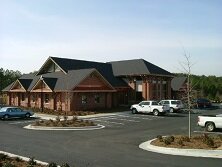Lose Weight and Keep it Off With Lap Band Surgery in Augusta, Georgia
If you’re looking for a reversible weight loss operation, laparoscopic adjustable gastric banding, or lap band surgery, may be an option for you.
 Adjustable gastric banding involves placing an inflatable (adjustable) silicone band around the very upper portion of the stomach just below the end of the esophagus. An access port for adjusting the band is placed in the fatty tissue of the abdominal wall above the abdominal wall muscles.
Adjustable gastric banding involves placing an inflatable (adjustable) silicone band around the very upper portion of the stomach just below the end of the esophagus. An access port for adjusting the band is placed in the fatty tissue of the abdominal wall above the abdominal wall muscles.
The band creates a new small pouch that limits the amount of food you can take in after surgery. It also slows the emptying of food from the esophagus to the stomach and intestine. This causes you to feel fuller sooner.
The operation takes about 1-2 hours to perform. Patients usually spend 1-3 days in the hospital following surgery and return work in 2-4 weeks after surgery.
Beginning no earlier than 6-8 weeks after the procedure, the degree of restriction can be adjusted as needed. The degree of tightness of the band around the stomach must be fine tuned every 1-2 months for the first 12-18 months and at least once a year thereafter for you to have the best possible weight loss. Lap band surgery requires committed follow up by the patient for successful and sustained weight loss.
The operation offers many benefits to patients. It is a reversible operation. The operating time and time spent in the hospital is shorter. There is not bypass of the intestine, so certain nutritional complications are less likely to occur. Patients have an average excess weight loss of 28-65% at 2-years following surgery and an average excess weight loss of 50% at 5-years following surgery. Patients also have significant improvement in medical conditions related to their weight.
The operation can be performed using open or laparoscopic techniques. At the Center for Obesity & Metabolism, most operations are performed using the laparoscopic or “minimally invasive” technique. All operations are performed by surgeons with expertise and specialty training in both laparoscopic and bariatric surgery. Your safety is our primary concern, so a handful of cases may be converted to the open technique if the laparoscopic operation cannot be done safely.
The benefits to minimally invasive or robotic surgery are significant, including:
- Smaller incisions
- Less pain
- Lower risks of infection
- Lower risk of hernia formation
- Less internal scar tissue
- Shorter hospital stay
- Faster recovery
Follow-up care is important to lasting success with the following schedule of post-surgery clinical visits:
- 1-3 weeks
- 4 weeks
- 3 months
- 6 months
- 9 months
- 12 months
- Then yearly
Certain patients are not good candidates for the adjustable gastric banding operation. This procedure is not usually recommended in patients with these medical conditions:
inflammatory bowel disease, severe heart and lung disease, bleeding disease of the upper GI tract, portal hypertension, anomalies of the GI tract, cirrhosis, chronic pancreatitis, substance abuse, any active infection, long-term steroid use, a personal or family history of autoimmune connective tissue disease (lupus, scleroderma) and pregnancy. The operation is also not recommended in patients with allergies to the band material, gastric or esophageal injury at the time of surgery or who are unable to follow instructions about diet after surgery.







